Ever caught yourself holding your breath during an intense workout?
Or noticed how your breathing changes when you’re stressed?
Your breath might be the most overlooked aspect of your fitness routine—until now.
Today’s best fitness trackers with breathing analysis aren’t just counting steps anymore.
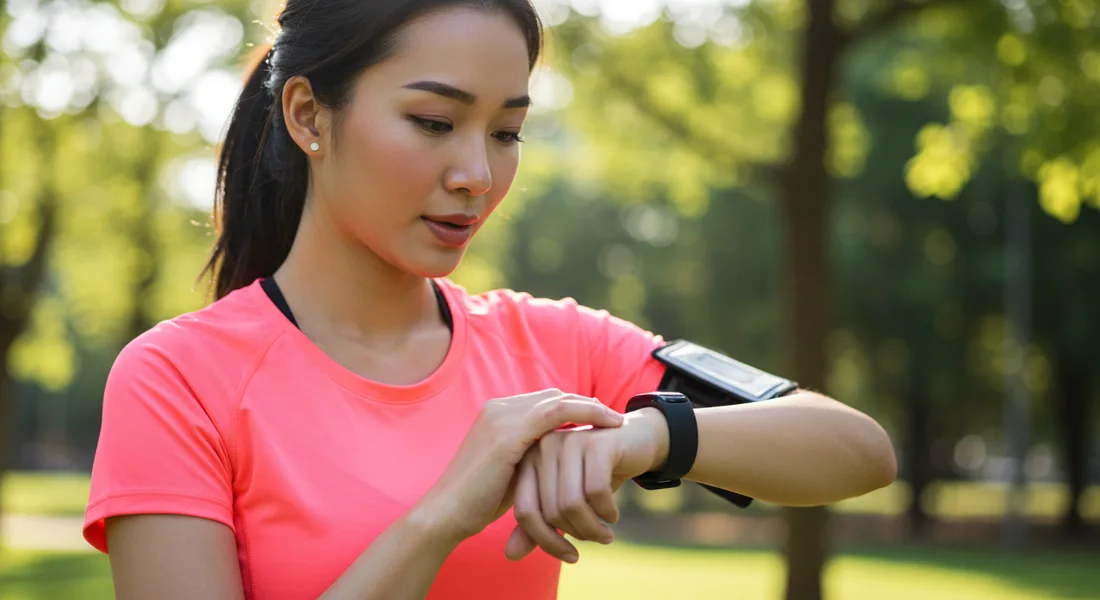
The latest game-changers are monitoring something far more fundamental – your breath.
And trust me, understanding your breathing patterns through these advanced fitness trackers with breathing analysis could be the key to unlocking your next fitness breakthrough.
Whether you’re an athlete looking to optimize performance or someone managing stress, the best fitness trackers with breathing analysis provide insights that were previously impossible to capture outside a lab setting.
The Science of Breath – Not Just Hot Air
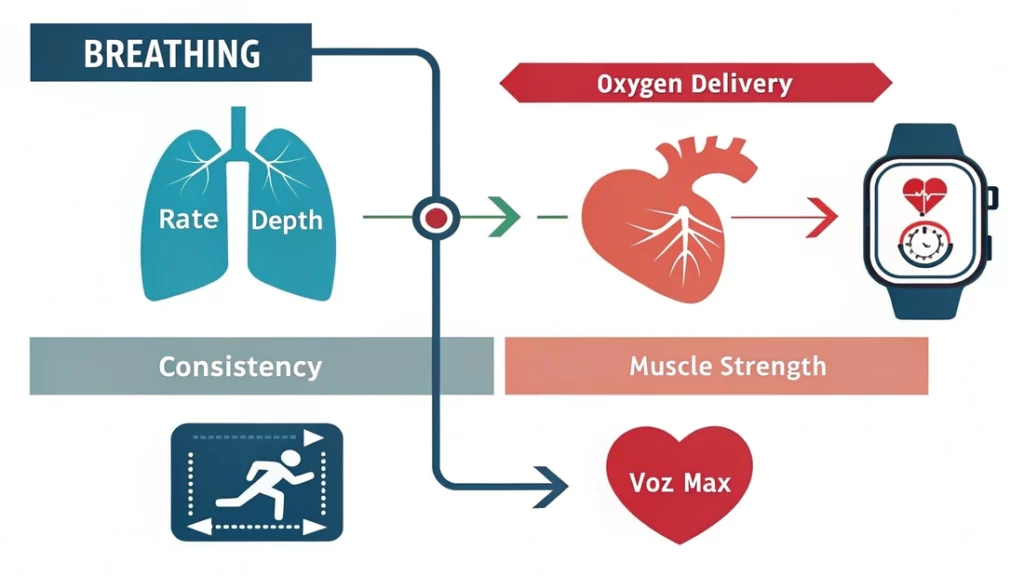
Before we dive into the gadgets, let’s talk about why breathing analysis matters.
When fitness trackers monitor your breath, they’re tracking metrics like:
- Breathing rate: How many breaths you take per minute
- Breathing depth: How deeply you’re inhaling and exhaling
- Consistency: How regular your breathing patterns are
But why should you care?
Because proper breathing is your secret weapon for:
- Supercharging oxygen delivery to hungry muscles
- Building stronger respiratory muscles (yes, those need training too!)
- Optimizing breathing patterns during different exercise intensities
- Boosting your VO2 max (fancy talk for how efficiently your body uses oxygen)
- Slashing stress levels and improving sleep quality
In other words, mastering your breath could be the difference between hitting the wall and smashing through it.
The Breath-Tracking All-Stars – Top Devices That Monitor Your Every Exhale
I’ve combed through countless reviews and tested numerous devices to bring you the cream of the crop.
These fitness trackers don’t just look pretty on your wrist—they’re breathing analysis powerhouses.
1. Fitbit Charge 5 — The Well-Rounded Wonder
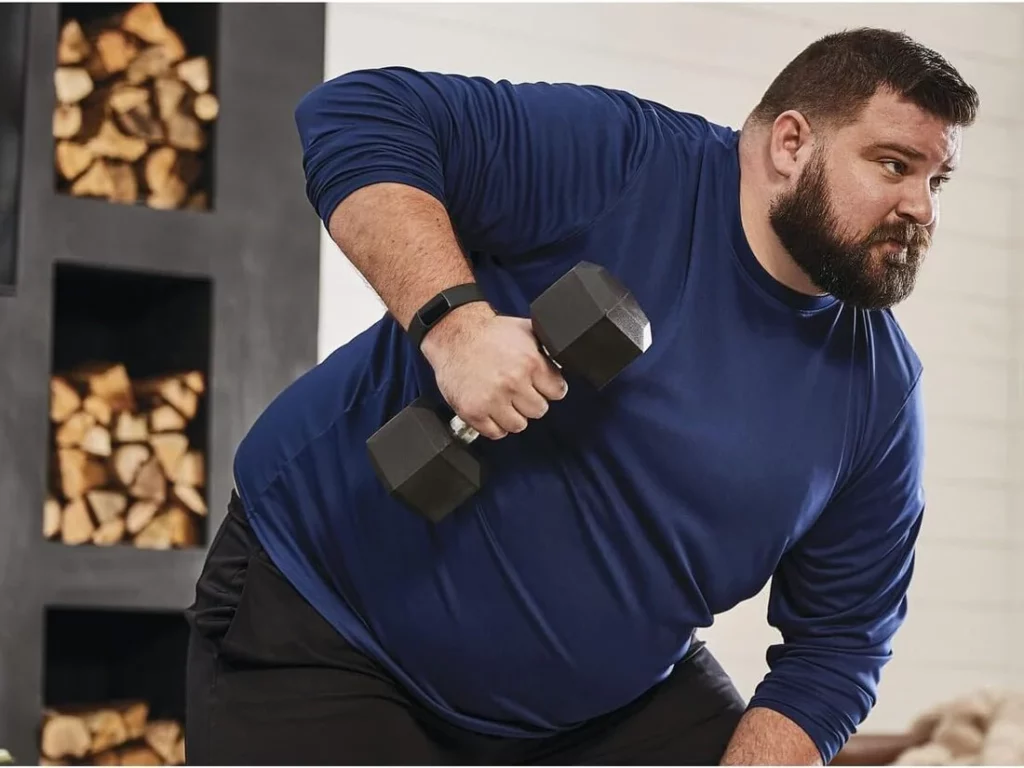
Breathing Features: Tracks breathing rate during sleep, stress management score, guided breathing sessions
What You’ll Love:
- EDA sensor actually measures your body’s stress response
- Comprehensive health dashboard that connects breathing to sleep quality
- Sleek design that doesn’t scream “I’m a fitness nerd!”
What Could Be Better:
- Premium subscription required for advanced breathing insights
- Battery life takes a hit when using all monitoring features
Price: $$ (Mid-range)
Link to Amazon on Fitbit Charge 5
Real Talk from Users: “The guided breathing sessions have been a game-changer for my anxiety. I use them during work breaks and before bed, and my sleep score has improved dramatically.” — Amazon reviewer.
2. Garmin Forerunner 245 Music — The Serious Athlete’s Companion
Breathing Features: Respiration tracking during activities and sleep, stress tracking with breathing recommendations
What You’ll Love:
- Detailed running metrics that correlate with breathing efficiency
- Training effect measurements that factor in breathing patterns
- Store music on your watch (because who doesn’t breathe better to their power playlist?)
What Could Be Better:
- Interface has a learning curve steeper than your last hill sprint
- Not as stylish for everyday wear
Price: $$$ (High-end)
Link to Amazon on Garmin Forerunner 245 Music
Real Talk from Users: “As a marathon runner, tracking my breathing rate during training has helped me find my optimal pace. I’ve improved my race times by focusing on breathing efficiency.” — Amazon reviewer
3. Samsung Galaxy Watch 4 — The Tech Enthusiast’s Dream
Breathing Features: BioActive Sensor that monitors breathing during sleep and exercise, snoring detection
What You’ll Love:
- Comprehensive body composition analysis
- Snoring detection paired with breathing analysis for complete sleep insights
- Seamless integration with Android devices
What Could Be Better:
- Limited compatibility with non-Samsung phones
- Battery life that sometimes needs a mid-day breather itself
Price: $$$ (High-end)
Link to Amazon on Samsung Galaxy Watch 4
Real Talk from Users: “The snoring detection combined with breathing rate analysis helped me identify sleep apnea I didn’t know I had. My doctor was impressed with the data I brought in.” — Amazon reviewer
4. Amazfit Bip U — The Budget-Friendly Breath Monitor
Breathing Features: Basic breathing rate monitoring, guided breathing exercises
What You’ll Love:
- Impressively accurate breathing metrics for the price point
- Battery life that keeps going and going (up to 9 days!)
- Simple, no-nonsense interface
What Could Be Better:
- Less detailed analysis than premium options
- Plastic construction feels less premium
Price: $ (Budget-friendly)
Link to Amazon on Amazfit Bip U
Real Talk from Users: “Perfect starter device for someone curious about breathing metrics without breaking the bank. The guided breathing exercises are surprisingly effective!” — Amazon reviewer
5. Apple Watch Series 8 — The Premium Breath Detective
Breathing Features: Blood oxygen monitoring, respiratory rate tracking during sleep, Mindfulness app with Breathe function
What You’ll Love:
- Beautiful visualization of breathing data
- Seamless health ecosystem that connects breathing to overall wellness
- Advanced sensors that provide medical-grade accuracy
What Could Be Better:
- The price tag might leave you breathless
- Daily charging required (no sleeping on charging duty!)
Price: $$$$ (Premium)
Link to Amazon on Apple Watch Series 8
Real Talk from Users: “The blood oxygen monitoring has been invaluable for my altitude training. I can see exactly how my body adapts to different elevation levels during mountain runs.” — Amazon reviewer
From Data to Deeper Breaths – Making the Most of Your Tracker
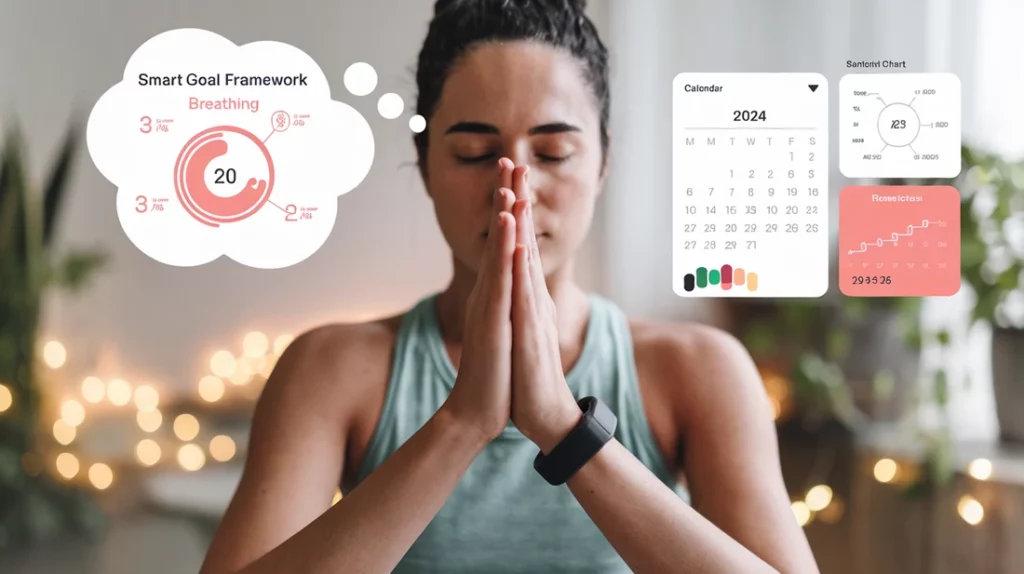
Buying a fancy gadget is one thing—using it to transform your fitness is another.
Here’s how to turn all those breathing stats into actual results:
Set SMART Breathing Goals
Instead of vague aspirations like “breathe better,” try these specific targets:
- Reduce your resting breathing rate by 1-2 breaths per minute over four weeks
- Maintain a consistent breathing pattern during the middle 15 minutes of your run
- Complete three guided breathing sessions per day for 14 days
Become a Data Detective
Your breathing data tells a story—you just need to learn how to read it:
- Higher-than-normal breathing rate during rest? You might be overtrained or fighting off an illness
- Irregular breathing during sleep? Time to look into your sleep quality
- Breath holding during strength training? Focus on exhaling during the effort phase
Free Apps to Supercharge Your Breathing Journey
Most trackers have their own apps, but these free add-ons take breathing practice to the next level:
- Breathwork: Customized breathing protocols for energy, relaxation, or performance
- Prana Breath: Tracks your progress with different breathing techniques over time
- Box Breathing: Simple guided exercises you can follow anywhere
Beyond the Wrist – Breathing Boosters to Pair with Your Tracker
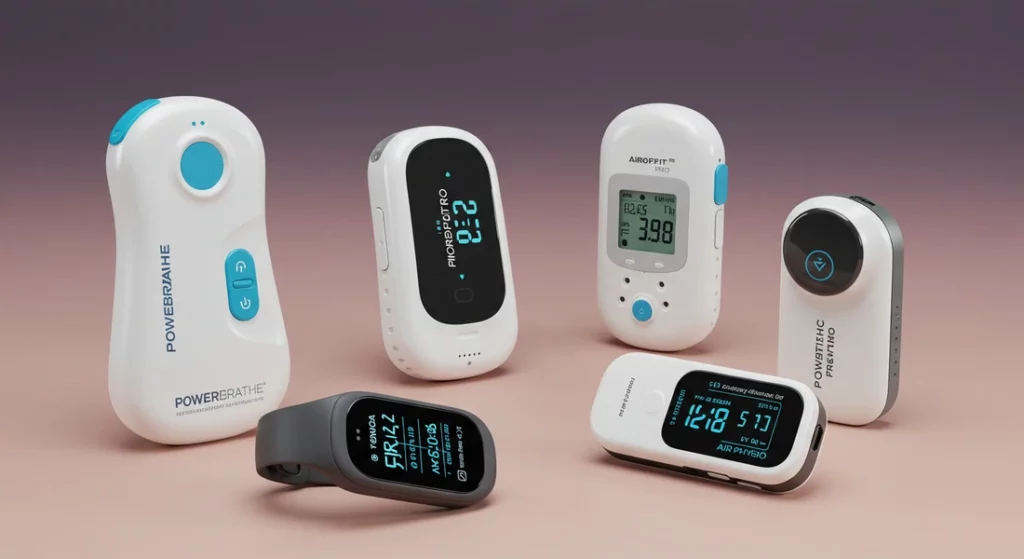
Your fitness tracker is just the beginning.
These Amazon-available tools can further enhance your breathing practice:
Respiratory Muscle Trainers
Just like any muscle, your breathing muscles respond to targeted training:
- POWERbreathe: The weightlifting equivalent for your diaphragm
- Airofit Pro : High-tech option with app connectivity to track progress
- The Breather: More affordable option with adjustable resistance
- Air Physio: Combines respiratory training with airway clearance
Breathe Easy: Environmental Helpers
- LEVOIT Air Purifier: Clean air makes for easier breathing during home workouts
- URPOWER Essential Oil Diffuser: Add a few drops of eucalyptus or peppermint for open airways
- Honeywell HumidPURE Humidifier: Maintain optimal humidity for respiratory health
Your Burning Questions, Answered
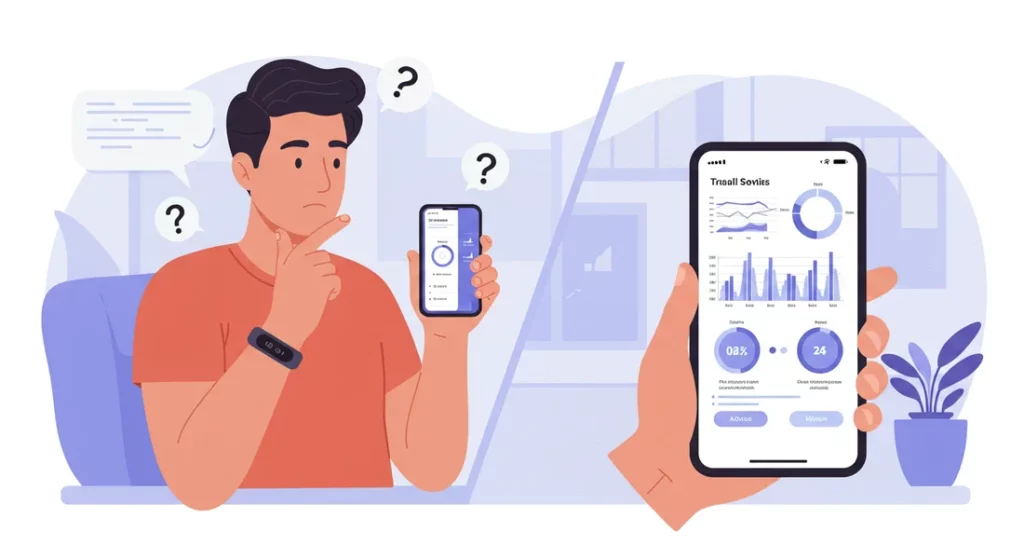
Q: Are these breathing metrics actually accurate? A: Most modern trackers are surprisingly precise, especially for trends over time. Medical-grade? Not quite. Useful for fitness improvements? Absolutely.
Q: Can fitness trackers help with conditions like asthma? A: While they’re not medical devices, many users report benefits from the increased awareness of breathing patterns. Always consult your doctor first, but the data can be valuable supplementary information.
Q: How quickly will I notice improvements in my breathing? A: Most people report noticeable changes within 2-3 weeks of consistent breathing practice. Athletes often see performance improvements even sooner.
Q: Do I need a smartphone to use these breathing features? A: For basic tracking, most devices work standalone. For detailed analysis and guided sessions, a smartphone connection unlocks the full potential.
Take a Deep Breath and Take Action
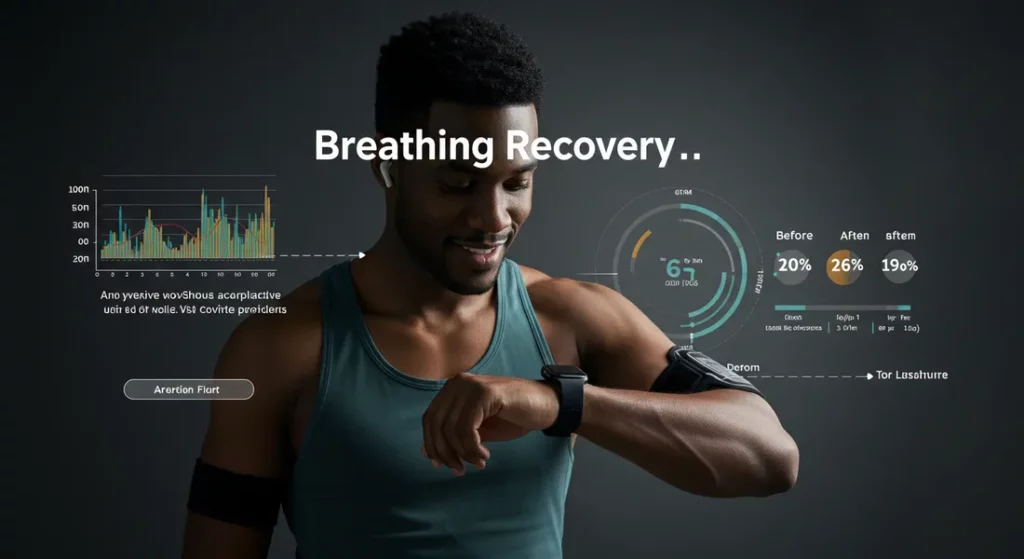
Your breath—something you do roughly 20,000 times per day—might be the most underutilized tool in your fitness arsenal.
With the right tracker on your wrist, you’re not just counting steps or calories; you’re tapping into the very essence of human performance.
Whether you’re a serious athlete looking to shave seconds off your PR, someone managing stress in a hectic world, or simply curious about optimizing your health, breathing analysis opens a window into aspects of your wellbeing previously invisible.
So take a deep breath, pick the tracker that fits your lifestyle and budget, and start paying attention to the rhythm that’s been with you since your very first moment—it might just lead to your next breakthrough.
Which breathing feature are you most curious to track? Let me know in the comments!
Related Posts
No posts
